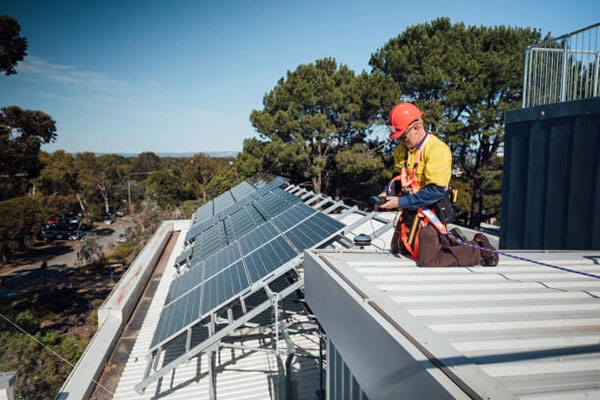In today's world, with the growing demand for energy and the increasing call for environmental protection, clean energy has become the center of attention. As a renewable energy source, solar energy, with its non-polluting, sustainable and inexhaustible characteristics, has gradually come into people's view and become one of the preferred sources of energy for families, enterprises and governments. By understanding the basics of solar energy, we can not only make better use of this resource, but also contribute to the protection of the earth. Power an Off-gird Home will take you into the world of solar energy to learn about its working principle, application prospects and the basics of installation and use.
Solar energy is a clean energy source that converts sunlight into electricity. Its basic working principle is to convert light energy into electricity through the photovoltaic effect. Solar panels consist of multiple photovoltaic cells that absorb photons from sunlight and convert their energy into electrical current. Specifically, when sunlight hits a PV cell, the photons transfer their energy to the electrons in the cell, allowing the electrons to gain enough energy to escape from their atomic bonds and form an electric current. This current is converted by an inverter into alternating current (AC) electricity for use in the home or business, which ultimately results in the utilization of solar energy.

Solar energy has many unique advantages. First, it is a renewable energy source. The sun provides endless energy to the earth every day, and as long as there is sunlight, we can utilize solar power. Secondly, solar energy is environmentally friendly. The process of solar power generation does not produce any pollutants and does not cause damage to the environment. Compared with traditional fossil fuels, solar power has no carbon dioxide emissions, which helps slow down global warming. Third, solar energy is inexpensive to use. Once installed, solar systems have very low operating and maintenance costs, and solar panels typically have a lifespan of more than 25 years, which can save users a lot of money on their electricity bills in the long run. In addition, solar energy systems are flexible and can be installed on the roof, on the ground or in other suitable locations without taking up too much land resources.
Application and Popularization of Solar Energy
Solar energy has a wide range of applications, which can be used in households as well as in commercial and industrial sectors. On the home front, solar energy systems can provide power to homes to meet the electricity needs of daily life. By installing solar panels, households can become self-sufficient and no longer rely on the grid for power, thus reducing electricity bills. At the same time, excess electricity can be stored in batteries for emergency use. Solar energy is even more convenient for remote and unpowered areas. By installing solar systems, residents in these areas can enjoy the convenience of electricity and improve their quality of life.
Solar energy also plays an important role in the commercial and industrial sectors. More and more companies are choosing to install solar energy systems to achieve green development goals. On the one hand, solar energy can provide businesses with a stable power supply and reduce operating costs. On the other hand, the use of solar energy can help to enhance the image of a company and demonstrate the importance it places on environmental protection and social responsibility. Particularly in industries with high electricity demand, such as manufacturing, agriculture and logistics, solar power can significantly reduce the energy expenditure of enterprises and improve their competitiveness.

In addition, governments are actively promoting the popularization of solar energy. Many countries and regions have introduced relevant policies to encourage residents and enterprises to install solar energy systems. For example, through tax breaks, subsidies, and low-interest loans, governments have provided financial support for the installation of solar energy systems, reducing the initial investment costs for users. At the same time, the government has also strengthened its investment in research and development of solar energy technology, pushing for technological advances and cost reductions, making solar energy the choice of more and more people.
Installation and Maintenance of Solar Energy Systems
There are several steps involved in installing a solar energy system. First, a site survey is required to assess the sunlight conditions and space situation of the installation site to determine the optimal installation location and angle. Typically, different types of solar panel need to be installed on a south-facing roof to maximize the amount of sunlight. Next, the solar system needs to be designed to determine the number of panels, the type of inverter, and the configuration of other auxiliary equipment. During this process, professional solar companies can provide technical support and advice to help users choose the most suitable plan.
The installation process requires attention to safety issues. Solar panels are usually installed on the roof and need to be operated by professionals to ensure the quality of installation and the safety of personnel. The electrical connections also need to be completed by a qualified electrician to ensure the safe operation of the system. Once the installation is complete, the solar energy system is ready to be put into operation, providing clean electricity to a home or business.

Maintenance of a solar system is relatively simple. Generally, the surface of the solar panel needs to be kept clean to ensure optimal photovoltaic conversion efficiency. Users can regularly inspect the panel surface to remove dust, leaves, and other debris. In addition, the electrical equipment in the system needs to be checked regularly to ensure that it is working properly. If any problems are found, professionals should be contacted for repairs to avoid further damage.
Future Development of Solar Energy
- As a renewable energy source, solar energy has a very bright future. With the continuous progress of technology, the efficiency of solar cells continues to improve, the cost is gradually falling, the application of solar energy will be more popular. In the future, solar energy can not only meet the electricity needs of households and enterprises, but also provide electricity for electric vehicles and promote the green transformation of the transportation industry.
- At the same time, the development of solar energy storage technology will further enhance the utilization rate of solar energy. Currently, advances in battery technology have led to decreasing energy storage costs, and solar systems can better store excess power to meet electricity demand at night and on cloudy days. In the future, solar energy storage systems will become an important part of the energy system, providing a stable supply of energy.
- In terms of policy, the government will continue to increase support for solar energy and promote the development of the solar industry. By formulating more favorable policies and perfect regulations, the government can guide more funds and resources into the solar energy field and promote technological innovation and market expansion. At the same time, international cooperation will also promote the development of solar energy. By sharing technology and experience, countries can work together to address energy and environmental challenges and achieve sustainable development goals.
Solar energy education is of great significance in raising public awareness of environmental protection and promoting clean energy. By popularizing the knowledge of solar energy and letting more people understand the working principle, advantages and application prospects of solar energy, it can stimulate people's interest and participation and create a good social environment for the development of solar energy. At the same time, educational institutions and the media should also actively publicize the knowledge of solar energy and promote the participation of all people to jointly promote energy transformation and environmental protection.

In terms of family education, parents can enhance their children's environmental awareness and scientific interest by learning about solar energy with them. Schools can incorporate solar energy knowledge into their curriculum and let students experience the charm of solar energy through experiments and practical activities. In the community, solar energy lectures and exhibitions are organized to let residents understand solar energy applications and installation methods, and to promote communication and cooperation among neighbors.
Solar energy is not only a clean energy source, but also a lifestyle choice. By using solar energy, we can reduce our dependence on fossil fuels, lower carbon emissions and contribute to the sustainable development of the planet. At the same time, solar energy can also bring economic benefits to households and businesses, and increase the autonomy and security of energy use. In the future energy landscape, solar energy will play an increasingly important role in leading us to a green, low-carbon future.
(1).png)
(1).png)